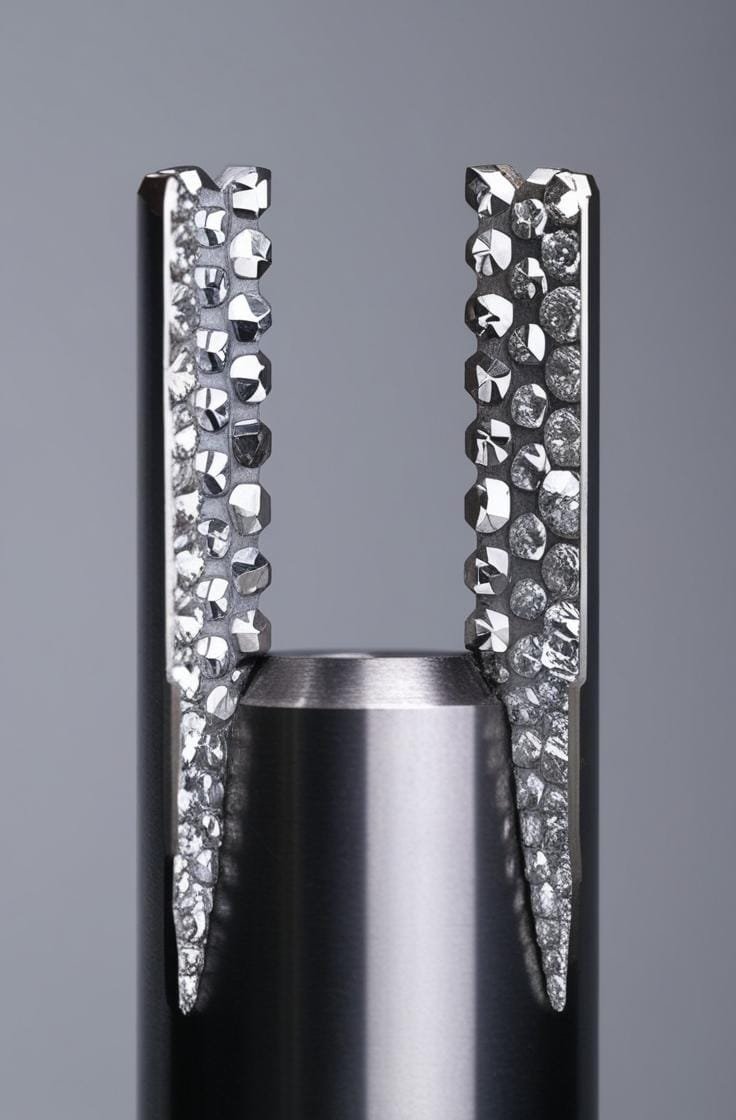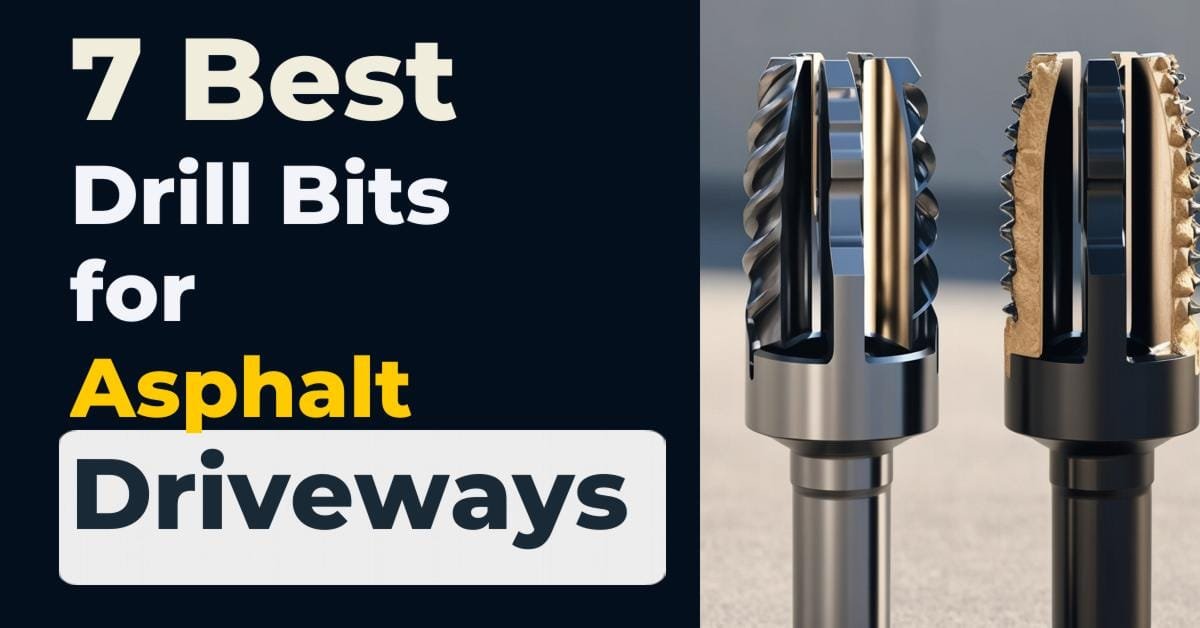For drilling asphalt driveways, use carbide-tipped masonry bits for small holes, hammer drill bits for medium holes with a hammer drill, and diamond-tipped core bits for large holes. Always start with a pilot hole and keep the bit cool with water.
I always make sure to use the right drill bit for asphalt driveways, whether it’s a tri-cone bit for tougher layers or a rotary bit for quicker jobs. In my experience, hammer drill bits are the go-to for patching up damaged sections of asphalt driveways efficiently and without wasting time. When you’re dealing with heavy-traffic asphalt surfaces, you need a durable bit, like the PDC, to get through those tough layers and keep the project on schedule.




Types of Asphalt Drill Bits According to Drill Type
Understanding the various types of asphalt drill bits is crucial to ensuring you’re using the best tool for the job. Here’s a breakdown of the most common types, their uses, and their advantages.
Rotary Drill Bits
Rotary bits are versatile and designed for general-purpose drilling into asphalt. They operate by rotating continuously and grinding through material.
Best Use Case
Rotary drill bits are ideal for shallow drilling, road assessments, and minor repair jobs.
Advantages
Cost-effective, easy to sharpen, and widely available.

Tri-Cone Bits
Tri-cone bits feature three rotating cones with embedded tungsten carbide or steel teeth, which allows them to crush harder surfaces.
Best Use Case
Use tri-cone bits for more abrasive asphalt layers or when precision is critical, such as coring through pavements for road condition assessments.
Advantages
High durability and effective in cutting through tougher asphalt layers.

PDC Bits (Polycrystalline Diamond Compact)
PDC bits are equipped with diamond layers that make them extremely tough and long-lasting.
Best Use Case
Best for very hard or highly compacted asphalt, especially in areas with heavy traffic.
Advantages
Long-lasting, highly durable, and offers faster drilling rates.

Hammer Drill Bits
These bits add percussive force to the rotating action, making them effective for drilling through asphalt faster, especially in patchwork jobs.
Best Use Case
Ideal for pothole repairs, shallow drilling, and instances where speed is important.

Advantages
Faster drilling in less time and energy.

Down-the-Hole Hammers vs. Top Hammer Drills
Down-the-Hole Hammers (DTH)
Used in deeper drilling where accuracy is key, like geotechnical investigations or subsurface sampling.
Top Hammer Drills
These are used for shallower, more general drilling, offering better control at higher drilling speeds.

Best Use Case
DTH for deep drilling; Top Hammer for shallower tasks.
Advantages
DTH excels in accuracy, while Top Hammer is faster for quick, shallow jobs.

Components of Asphalt Drill Bits
The performance and durability of drill bits depend heavily on their components. Understanding these parts will help you choose the best tool and know when it needs maintenance.
Cutting Elements
The most critical part of any drill bit is its cutting elements. Asphalt drill bits usually feature one of two types:
Tungsten Carbide Inserts
Extremely hard and durable, these inserts last a long time and can withstand heavy wear and tear.
Diamond Impregnated Segments
For more demanding projects, diamond-impregnated bits provide higher cutting efficiency and last even longer in harsh conditions.
Drill Bit Body
The body of the drill bit influences its durability and resistance to bending under pressure. Common materials used include:
Steel Body: Offers more durability and is resistant to impacts and deformation.
Composite Materials: Lightweight and sometimes more flexible, composite bodies are easier to handle for some projects
Drilling Applications
Asphalt Pavement Coring
This involves extracting a cylindrical sample from an asphalt surface, usually to assess the material’s condition.
Best Bits:
Tri-cone or PDC bits work best because they can handle tough layers of asphalt and provide precision.
Road Condition Assessment & Pothole Repair Evaluation
Evaluating road conditions or repairing potholes requires specific drill bits that offer speed and accuracy. Rotary or hammer drill bits are excellent for shallow, quick drilling.
Asphalt Overlay Thickness Measurement
When determining the thickness of an asphalt overlay, a precise drill bit is crucial to get accurate readings. Use tri-cone or rotary bits for best results.
Pavement Rehabilitation Planning & Quality Control Monitoring
Bits that can handle coring and subsurface sampling will be essential here. Down-the-hole hammers are best suited for these tasks due to their accuracy.
Performance Characteristics
Drilling Speed
The drilling speed depends on the bit type, the asphalt’s hardness, and the drilling equipment used. Rotary bits offer steady but slower drilling, while hammer drill bits provide faster drilling.
Durability and Wear Resistance
PDC and tungsten carbide inserts offer the best wear resistance, which is critical when drilling through thick or heavy-duty asphalt.
Drill Bit Selection Criteria
Asphalt is a mixture of aggregate (small stones and sand) bound together with bitumen, a sticky, black petroleum by-product. This composition makes asphalt flexible and durable, but also challenging to drill through.
In my years of experience in the Asphalt Industry, many DIYers struggle with the wrong tools because they don’t realize how tough asphalt can be. Trust me, using the right drill bit will save you time, money, and a lot of frustration.
Choosing the right drill bit for asphalt drilling depends on multiple factors, such as:
Asphalt Hardness:
The harder the asphalt, the more durable the bit needs to be.
Aggregate Type and Content:
The composition of the asphalt influences bit wear.
Drilling Depth Requirements:
Deeper drilling projects require DTH hammers, while surface jobs can use top hammers or rotary bits.
Maintenance and Repair
Proper maintenance extends the life of your drill bits. This includes:
Bit Sharpening
Sharpening tungsten carbide and diamond segments periodically ensures they keep cutting efficiently.
Drill Bit Replacement
Monitor wear to avoid costly project delays. Replace bits when they lose cutting power or show excessive wear.

Carbide-Tipped Masonry Bits: Your Go-To for Small Holes
Carbide-tipped masonry bits are my top choice for small holes up to about 1/2 inch in diameter. Here’s why:
Durability:
The carbide tip stays sharp longer when drilling through abrasive materials like asphalt.
Versatility:
These bits work with standard drills, making them accessible to most homeowners.
Cost-effective:
They’re relatively inexpensive compared to specialized bits.
I’ve used carbide-tipped bits countless times for installing driveway markers and small drainage holes. They’re perfect for these tasks.


Pro Tip: Always start with a smaller pilot hole and gradually increase the size. This technique has saved me from cracking the asphalt more times than I can count.


Hammer Drill Bits: Medium-Sized Holes Made Easy
When you need holes between 1/2 inch and 1 inch, hammer drill bits are your best friend. These bits are designed to work with hammer drills, which combine rotary motion with a hammering action.
Key benefits:
Efficiency:
The hammering action breaks through asphalt faster than standard drilling.
Precision:
Less likely to wander off course when starting the hole.
Reduced wear:
The impact action means less friction, extending the bit’s life.
I remember the first time I used a hammer drill on asphalt – the difference was night and day compared to a standard drill. It cut my working time in half!


Diamond-Tipped Core Drill Bits: The Heavy-Duty Solution
For larger holes over 1 inch in diameter, diamond-tipped core drill bits are the way to go. These bits are typically used with a core drill and are ideal for tasks like installing posts or creating large drainage openings.
Why I love diamond-tipped core bits:
Smooth cutting:
They produce clean, precise holes with minimal chipping.
Longevity:
Diamond tips last much longer than other materials when cutting abrasive surfaces.
Versatility:
Can handle a wide range of hole sizes.
1. Do you need a hammer drill for asphalt?
Yes, a hammer drill is ideal for drilling medium-sized holes (1/2 inch to 1 inch) in asphalt. The hammering action breaks through asphalt faster than a standard drill.
2. Can you use a core drill for asphalt?
Yes, for holes over 1 inch, diamond-tipped core drill bits are the best option. These bits create smooth, precise cuts with minimal chipping.
3. How do you drill into asphalt?
To drill into asphalt, choose the right bit: carbide-tipped masonry for small holes, hammer drill bits for medium holes, and diamond-tipped core bits for larger holes. Start with a pilot hole, keep the bit cool with water, and apply steady pressure.

Caution: These bits require a steady hand and proper technique. The first time I used one, I was amazed at how smoothly it cut, but also realized the importance of maintaining consistent pressure and speed.
Spade Bits: A Budget Option for Softer Asphalt
While not my first choice, spade bits can work on softer or older asphalt for holes up to about 1 inch. They’re inexpensive and widely available, making them a decent option for occasional use.
When to consider spade bits:
- You’re working with older, softer asphalt
- You only need to drill a few holes
- Budget is a primary concern
Personal Experience: I once used a spade bit on an old driveway that was due for resurfacing. It worked surprisingly well, but I wouldn’t recommend it for newer or harder asphalt surfaces.
Step Drill Bits: Versatile Option for Multiple Hole Sizes
Step drill bits, also known as unit or cone bits, can be useful for drilling asphalt, especially when you need holes of varying sizes.
Advantages of step drill bits:
- Multiple sizes in one bit
- Reduces the need for pilot holes
- Works well for thin asphalt layers
Concrete Drill Bits: A Sturdy Alternative
While designed for concrete, these bits can also handle asphalt effectively. They’re a good option if you already have them on hand or plan to drill into both concrete and asphalt.
Key features:
- Durable construction
- Available in various sizes
- Can handle the abrasiveness of asphalt
Drilling Technique: Tips for Success
No matter which bit you choose, proper technique is crucial. Here’s what I’ve learned over the years:
Start with a pilot hole:
Always begin with a smaller bit and gradually increase the size.
Keep it cool:
Use water to cool the bit and reduce dust. I like to have a spray bottle handy.
Steady pressure:
Apply consistent, moderate pressure. Let the bit do the work.
Clean as you go:
Regularly clear debris from the hole to prevent binding.
Safety first:
Always wear eye protection and a dust mask.
Thank you for reading this guide. I hope my experiences and tips help you with your next asphalt drilling project. Happy drilling!
